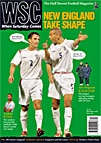 When countries had only one European Cup entrant, the UEFA Cup commanded attention. All that seemed to change. But, asks Luke Chapman, is the junior competition now the less predictable one?
When countries had only one European Cup entrant, the UEFA Cup commanded attention. All that seemed to change. But, asks Luke Chapman, is the junior competition now the less predictable one?
Two years ago, after a defensive display in Turin earned Liverpool a place in the semi-finals of the Champions League, a radio reporter light-heartedly asked a Reds fan what was more important: winning the European Cup or ensuring qualification for the competition next year. “Hmm,” pondered the supporter, apparently in all seriousness, “that’s a tough one."
It may be a puzzle to think that some supporters of Britain’s most successful club would even consider securing future income as a priority over lifting the club game’s most prestigious trophy. Yet if the all-consuming Champions League beast is increasingly looking like an exercise in product placement, then its poor relation the UEFA Cup is giving hints that it may be able to provide an alternative.
This year’s group stages for the second-string tournament have a degree of competitiveness that makes a welcome change from the procession of the CL. Newcastle were drawn in a tough group that includes Palermo and Celta Vigo. Tottenham drew Bayer Leverkusen (CL finalists in 2002) and Dinamo Bucharest, 5-1 conquerors of Everton last season, while Blackburn will need to qualify from a group that includes Feyenoord. This is not a case of the elite pitted against each other. The UEFA Cup is what it is – a second-string competition for also-rans. But a feature of these groups is that there is at least a sense of unpredictability and variety.
Contrast this with the Champions League groups. Chelsea and Barcelona have been pitted against each other for the third time in as many seasons. The way the competition is stacked in favour of clubs with the best resources from the wealthiest leagues means this is a likely pairing rather than luck of the draw. What in seasons past would have been a rare and special event is now in danger of becoming a predictable fixture.
It is also arguable that the UEFA games themselves provide better entertainment, with Middlesbrough’s and Celtic’s runs to their recent finals perhaps more exciting than either Liverpool’s or Arsenal’s. There is certainly more variety in terms of those sides that eventually triumph. In the last decade the CL winners have been drawn from a small gene pool – four from Spain (with Real Madrid three-time winners), two each from England and Germany and one each from Italy and Portugal; the UEFA cup has provided a winner from eight different nations in the same period, with no side winning it more than once.
What’s more, TV viewing figures bear healthy comparison with the CL. This season’s CL tie between Arsenal and Porto screened on ITV4 pulled in a peak of 920,000 viewers; Spurs against Slavia Prague and West Ham v Palermo attracted a high of 1.2 million. The latter clubs’ seven-year absence from European competition no doubt played a part and ratings are higher on the main channels, but last season’s UEFA Cup final pulled in a peak of 7.7m viewers, a healthy showing against the 12.3m peak that watched Barcelona beat Arsenal.
The UEFA Cup undoubtedly has its faults. The coefficiency ratings that determine seedings are questionable, resulting in Newcastle (one Fairs Cup in 40 years), having a rating way ahead of that of Ajax (four European Cups in the last 35). The parachuting of teams knocked out from the CL is also contentious, as it effectively rewards failure (2005’s winners CSKA Moscow were one such beneficiary). And there is the lingering sense that the UEFA Cup is a just a half-hearted sop to middling clubs from rich nations who have missed the CL boat.
The UEFA Cup cannot compete with the CL in terms of revenue. It may mimic the worst excesses of its sibling (controversially, Spurs are treating home ties as Category A games, with ticket prices to match), yet the financial gulf between the two competitions is enormous: Arsenal made upwards of £26m from the CL last year, a level of income that dwarfs anything the UEFA Cup provides. But should revenue be the determining feature by which a competition should be judged?
The CL, with its unprecedented financial rewards, has become such a dominant feature of football that the race for the qualifying places is assumed to be “worth” more than winning silverware. The UEFA Cup may be one way of redressing the balance, because its real value is not in what it provides financially but the opportunity it gives to lift a trophy. And shouldn’t that at least be partly what European football is about?
From WSC 238 December 2006. What was happening this month